AN ODD THING HAPPENED
by Steve Herring
First of all, let me put out three important words: STATUTE OF LIMITATIONS. Whatever the Herring brothers may have done in the turbulent, explosive sixties must surely be beyond the reach of legal if not moral consequences. We were, you see, part on an underground movement at that time. No, not Students for a Democratic Society, not the Weathermen, no, far worse: corrupting the minds of America's youth with nicely drawn drivel all in the name of humor. Guilty as charged (except note the three important words above). We did ODD. It was a modest fanzine dedicated to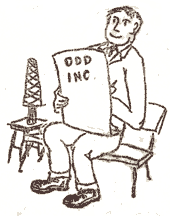 the humor and style of the original comic book format of MAD magazine. We meant no harm (or not very much). The audience was small and nerdy. You can call it the butterfly effect or the snowball effect, but the cause and effect relationship cannot be ignored. ODD was published in 1964-65; what followed was Vietnam, assassinations, riots, Manson, Watergate, leisure suits... who would dare call it coincidence!? the humor and style of the original comic book format of MAD magazine. We meant no harm (or not very much). The audience was small and nerdy. You can call it the butterfly effect or the snowball effect, but the cause and effect relationship cannot be ignored. ODD was published in 1964-65; what followed was Vietnam, assassinations, riots, Manson, Watergate, leisure suits... who would dare call it coincidence!?
So Dave and I went under cover. He assumed the identity of a commercial artist and illustrator for a respected international newspaper. I became a mild-mannered systems analyst for a major computer manufacturer. We watched from the sidelines as the horrors unfolded, feigning total innocence. Although the ODD presses went silent, we were pleased to observe the ODD brand of subversive humor lived on. We saw it in the works of one R. Crumb who introduced elements of biological reproduction that single-handedly kicked off the Moral Majority movement (see my article “Pornography in Fandon,” ODD #11). Then there was Monty Python with its British twist on our irreverent humor, aided and abetted by the artwork of American born Terry Gilliam, an acolyte of our beloved Harvey Kurtzman and contributor to Kurtzman's Help! magazine.
And there were others over the years. Gary Larson and his Far Side single-panel cartoons stands out. One day at work I received a tenth generation photocopy of an essay entitled “How to Make a Board,” by a Dave Barry, who I assumed was one of the wiseguy engineers in our corporation. It was very funny, and when I discovered Dave Barry was a columnist who actually wrote these things for a living, I was hooked and became a long-time fan.
Meanwhile, ODD and the Herring Brothers receded into distant and dusty memory until one evening, about fifteen years ago, the phone rang. It was a suspicious character calling himself Bill Schelly trying to track us down. After making sure he was not FBI, ATF, or IRS, and that this was not all a ruse to sell me aluminum replacement windows, I confessed to having been involved in some way with an ancient fanzine called ODD. Thus began our public reemergence, in the form of reprints in Bill's various anthologies put out by his Hamster Press. And that might have been that until this thing called The Internet came about.
Imagine a medium where you don't have to worry about paper, ink, staples, postage or those poor little hamsters running the presses! This is the promise of The Internet. For now, a platform for a nostalgic look back at The Age of ODD. For tomorrow, who knows? Or, in other words, HOO HAH!
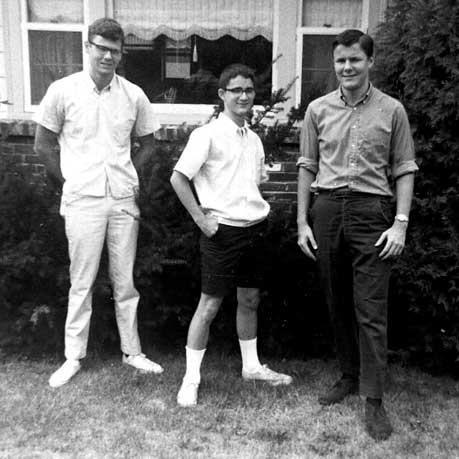
Steve, Jay, and Dave in 1965
at ODD headquarters in Natick, MA.
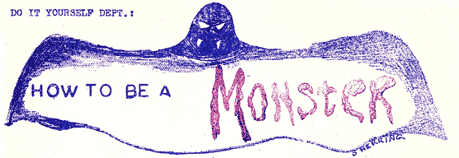

A small sample of Steve's contributions to ODD. Steve often wrote stories illustrated by Dave, like The Fidgitive from ODD #5.
Dave Herring ODD Blog
Marv Wolfman ODDBLOG
|
The ODD Episode
By Jay Kinney
The Herring Brothers’ fanzine ODD first appeared in 1964, during the early period when Comics Fandom was on its way to establishing itself. This largely teen-age subculture came into self-awareness through the letters pages of DC comics, where budding comic critics would pass judgment on previous issues of The Flash, The Atom, The Justice League of America, and the endless permutations of the Superman family (Superman, Superboy, Supergirl, Jimmy Olson, Lois Lane, et al.)
These were pretty slim pickings, and the older comics fans – most notably Dr. Jerry Bails, a thirty-something among the teens – tended to re-direct comics fans’ gaze back to the “Golden Age”, the period from the late ‘30s to the mid ‘50s when there were scores of comic publishers, all battling it out for newsstand space and wildly trying out different comics genres in the search for a hit title. That era reached an abrupt end, courtesy of congressional hearings and the implementation of self-censoring measures by the comic book publishers, most of whom soon left the business altogether.
Bails was born in 1933, hence his childhood coincided with the “Golden Age”, and he infused his fan activities with an undeniable nostalgia for the earliest manifestations of comic book super-heroes. (Bails was especially taken with DC’s All-Star Comics, the home of the Justice Society of America.) The bulk of comics fans in the early ‘60s were ten or fifteen years younger than Bails, (I was eleven in 1961-62 when I first came across fandom), and most Golden Age comics were relative rarities mainly known to young comics fans through second-hand references and descriptions in fanzine articles.
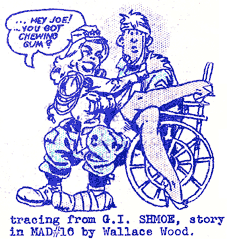 Steve and Dave Herring came to comics fandom through their love for MAD Comics, the initial comic book manifestation of what would become Mad Magazine in 1955. MAD was the brainstorm of Harvey Kurtzman, an editor for William Gaines’ EC comics line, and MAD distinguished itself by satirizing and parodying other comic books, comic strips, and such cultural icons as the tabloid New York Daily News. MAD was, in a sense, a meta-comic, maintaining an ironic distance from the other comics on the newsstand, which provided the grist for MAD’s mill. Steve and Dave Herring came to comics fandom through their love for MAD Comics, the initial comic book manifestation of what would become Mad Magazine in 1955. MAD was the brainstorm of Harvey Kurtzman, an editor for William Gaines’ EC comics line, and MAD distinguished itself by satirizing and parodying other comic books, comic strips, and such cultural icons as the tabloid New York Daily News. MAD was, in a sense, a meta-comic, maintaining an ironic distance from the other comics on the newsstand, which provided the grist for MAD’s mill.
ODD, the Herrings’ tribute to MAD, was thus a meta-fanzine, an amateur publication residing in comics fandom, but given to maintaining an ironic distance from other fanzines.
But such observations are all in retrospect. I am certain that Steve and Dave wouldn’t have couched it in such terms at the time. They just wanted to enjoy the rush of trying to recreate a latter-day MAD, using ditto masters and shading plates, and cranking out a hundred or so copies to distribute to other fans within comics fandom.
About the same time that ODD got off the ground, comics fandom was experiencing an upsurge, fed in part by the successful revival of Marvel Comics under the editorship of Stan Lee. Lee benefited from having the considerable talents of seasoned artist Jack Kirby at his disposal, and together they began to pump out new superheroes (the Fantastic Four, the Amazing Spider-Man and so on) in direct competition with DC’s old war-horses and re-treads. A newer and younger wave of comics fans discovered fandom, a select few of whom were attracted to ODD’s satirical mission.
I was among those few. I had been alerted to comics fandom through the letters column in Justice League of America back in 1962, and became a reader of Alter-Ego and the Comic Reader, but super heroes were not what I liked most. I aspired to be a professional cartoonist or illustrator of some sort, but drawing muscle-men in skin-tight costumes was not my idea of fun, unless I was lampooning them. ODD fit my attitude perfectly.
Between the fall of 1964 and December 1965, Dave Herring and I engaged in an intensive correspondence, exchanging letters nearly weekly. I was in my first two years of high school, and Dave was four years older and stuck in a limbo of living at home, producing ODD, and waiting for the draft board to discover his availability. With his older brother Steve off in college, Dave was the main editorial force behind ODD, and he encouraged me to contribute whatever art and humor I could muster.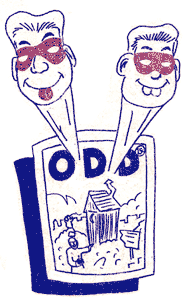
My main stumbling blocks were that I could barely draw, I had no consistent “style” to speak of, and my sense of humor was quite literally sophomoric.
It is a testimonial to Dave’s optimism and kind-heartedness that he saw some spark of creativity in my work and egged me on. I can’t overestimate the significance this had for me as an alienated adolescent nerd stuck in the white bread suburbs of Chicago with few friends and overblown dreams of a career as a famous cartoonist.
Over the course of a year and a half, at a key time in my life, ODD was my lifeline to a sense of community, critical thinking, and satirical comradeship.
It didn’t take long for ODD to inspire me to publish my own satirical zine, NOPE, which was more an amateur humor magazine than an amateur comic book. Dave guided me through the ins and outs of hectograph reproduction for the first two issues, and then offered to publish NOPE #3 as a full-blown dittoed fanzine. By the time that this issue came out, ODD was mostly over, NOPE was a swan song of sorts, and I was ready to abandon comics fandom for the more sophisticated milieu of science fiction fandom.
By the summer of 1968, I’d graduated from high school, had met up with Jay Lynch, Skip Williamson, and Robert Crumb, and dove head first into the underground comix movement, which was just getting off the ground. Whatever talents I brought to that undertaking were first fostered by ODD and the Herring Bros. I’m not sure if they should take that as credit or as blame, but before any more time passes, I’d just like to say, “Thanks, guys!”
Return to ODD home page |